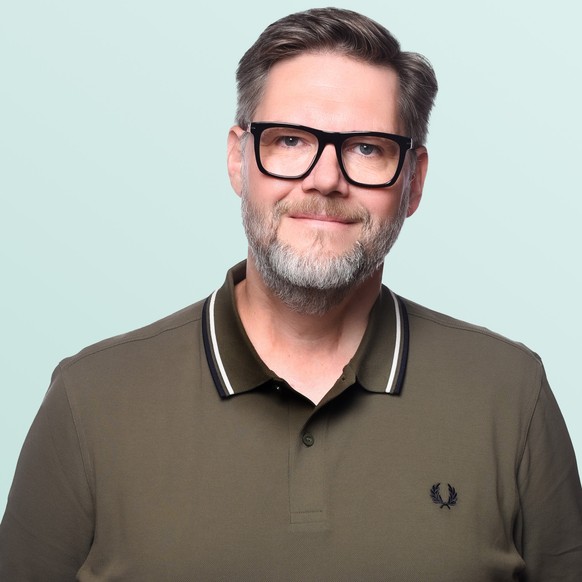
Mental health problems at work? How an immediate counselor can help

The immediate advisors also provide assistance over the phone.Image: IMAGO/Panthermedia
Jobs with a future
In our series “Jobs with a Future” we take a look at jobs that are particularly exciting. Because they are new, future-proof or simply different. Or because they make the world better in some way.
In medicine, first aid means intervening in an acute emergency when people collapse with a heart attack or injury. But are there such “rescue forces” for mental crises? Absolutely. Michael Krooss is one of them.
The Hamburg native is an immediate consultant or mental health coach at the Fürstenberg Institute. He leads a team that helps employees and managers overcome psychological crises anonymously and free of charge, provided their employers have booked the institute’s service. The counselors can also be called if there are traumatic experiences at work (e.g. a bank robbery).
In an interview with watson, Michael Krooss explains what topics people contact him with and how one gets into such a profession.

Michael Krooss is a mental health coach.Image: PR
watson: How should I imagine your job?
Michael Krooss: I am head of our immediate advice department. This means that my team – which includes psychologists and social educators – and I advise people on a wide range of life topics by telephone, video and chat. The aim is for the people affected to feel good again once the topics have been discussed and then be able to work motivated without mental stress. Companies pay us and they are interested in their employees being able to do their work with a clear mind.
Are the problems work related?
Sometimes there is a direct reference to the workplace: “I was sick for a long time and am afraid to go back” would be an example. Even more private topics, like: “I can’t handle my divorce.” All of this can have an impact on your ability to work.
“It makes more sense for companies to help their employees through a crisis quickly rather than having the affected person take time off sick.”
Do you only book companies where employees have to be particularly emotionally stable?
We serve all kinds of industries. In recent years, companies have become increasingly aware of how important the mental health of their employees is. At the same time, there are too few psychotherapy places in Germany. We are therefore receiving more inquiries than ever before, and this is definitely a growing market. Because: It makes more sense for companies to help their employees through a crisis quickly than for the affected person to be absent due to illness or even quit.
Watson is now on WhatsApp
How can I imagine such a conversation?
For example, a manager once called me and said she had to fire a woman in twenty minutes but didn’t feel comfortable with the decision. Then we talked about why this feeling was there for about fifteen minutes. The appointment was postponed and instead we talked to the supervisor about the fact that the employee was not the problem, but rather the structure. That was the better solution. These short interventions that provide concrete help are some of the most exciting.
Do you have to be experienced to be able to intervene so quickly?
Life experience helps, but there are also techniques. My team consists of ten people with a wide range of academic backgrounds and two to three years of systemic counseling training. There you learn how to resolve a decision-making problem, i.e. how do you help someone to make a good decision?
What would be a good decision?
As adult a decision as possible. A decision that is not influenced by negative beliefs or fears from childhood, but that is appropriate to the situation in the here and now. The feeling usually says: “Do it as usual, better safe than sorry”. We ask: What would happen if you tried against your first impulse? Would the result even be better?
Finding a quick solution sounds stressful.
Sometimes it is. We also deal with serious issues such as suicidality or so-called “stressful events”. For example, when a colleague was run over by a large machine and everyone had to witness it. We then go to the companies to talk to the people affected on site so that what happened does not turn into a trauma.
Does it feel good to be able to help in times of crisis?
Absolutely. Sometimes someone calls and says that he or she no longer wants to live. We then accompany the person on the phone to the psychiatric emergency room and wait until they are in good hands. People are grateful for that and that feels good, yes.
Are you feeling desperate?
Children and youth telephone: The “Numbers Against Sorrow” association primarily cares for children and young people. Reachable Monday to Saturday from 2 p.m. to 8 p.m. on 116 111.
Crisis chat: With Crisis Chat you can contact volunteer advisors via WhatsApp around the clock. The service is aimed at people up to 25 years of age.
How much time do you spend coaching someone?
Usually an hour. In the immediate consultation we work without appointments and are always available between eight a.m. and 8 p.m. An hour is often enough because the first step is to sort out your thoughts or get a helpful impulse. If there is a need for further discussion, we will hand it over internally to our mental health coaching experts, where you can then arrange follow-up appointments. We are, so to speak, first aid when there is a fire.
“This one hour is not about solving the problem, but about tackling it for the first time.”
This is beneficial for people who are hesitant about therapy because they think: “Then I’ll be opening up a life issue that I’ll be dealing with for years to come”?
Yes, in therapy I have to expect that existential issues will be touched upon. And I actually can’t stop the therapy until this wound is treated again. That just takes time. With systemic consulting we are on a different level. We try to approach the problem in a very practical way. Of course, sometimes one thing leads to the other. If someone notices that they keep stumbling at the same point, the question is justified: Is this a life issue for you?
Is an hour enough to help?
This one hour is not about solving the problem, but about tackling it for the first time. If someone calls and says, “I think I have an addiction problem,” then it’s a good thing that they’re even saying it out loud, maybe for the first time. You can then move on and hand it over to advice centers or clinics in our network. It’s about that first impulse.
As if someone flipped a switch.
We once counseled someone who was addicted to cocaine. He had hidden this from his family for years and was 100,000 euros in debt. While those around him thought everything was fine, the noose around his neck tightened. He called us and said: “My life is over. I don’t know what to do.” Such problems are of course much bigger than we can solve. But we can see: What exactly can he start with now?
Do you take such dramas home with you?
We don’t take on one crisis after another. There are ten people in the team, so the load is spread out. If a problem is very close to someone’s heart, we exchange ideas and there is external supervision in the group every six weeks. However, this is usually not necessary because the effectiveness of the advice helps. We give options for solutions and when you hang up, you know: I’ve done everything.
The rest is out of your hands?
This is where counseling training is good because you learn: I can help people to listen to themselves and plan a change, but if the other person decides not to do what was discussed and instead lets the catastrophe continue – for example, by continuing to take cocaine – that is their free decision. That doesn’t burden me, no.
For a long time, it felt like only narcissists were around me. I always asked myself: Why am I so magically attracted to them? And why do I – consciously or unconsciously – seek contact with them?
To get straight to the point: I came damn close to having a narcissistic disorder. For many years I had a kind of mental branding in my head that my grandfather burned into me. I remember him telling me over and over again as a little boy: “If you are successful, if you are the hero, if you look good, if you shine, you will be loved. If you are not, you are worthless in society.” Of course, I didn’t understand that at first, but over the years I got more and more of a feeling for what that meant.

Ethel Purdy – Medical Blogger & Pharmacist
Bridging the world of wellness and science, Ethel Purdy is a professional voice in healthcare with a passion for sharing knowledge. At 36, she stands at the confluence of medical expertise and the written word, holding a pharmacy degree acquired under the rigorous education systems of Germany and Estonia.
Her pursuit of medicine was fueled by a desire to understand the intricacies of human health and to contribute to the community’s understanding of it. Transitioning seamlessly into the realm of blogging, Ethel has found a platform to demystify complex medical concepts for the everyday reader.
Ethel’s commitment to the world of medicine extends beyond her professional life into a personal commitment to health and wellness. Her hobbies reflect this dedication, often involving research on the latest medical advances, participating in wellness communities, and exploring the vast and varied dimensions of health.
Join Ethel as she distills her pharmaceutical knowledge into accessible wisdom, fostering an environment where science meets lifestyle and everyone is invited to learn. Whether you’re looking for insights into the latest health trends or trustworthy medical advice, Ethel’s blog is your gateway to the nexus of healthcare and daily living.




